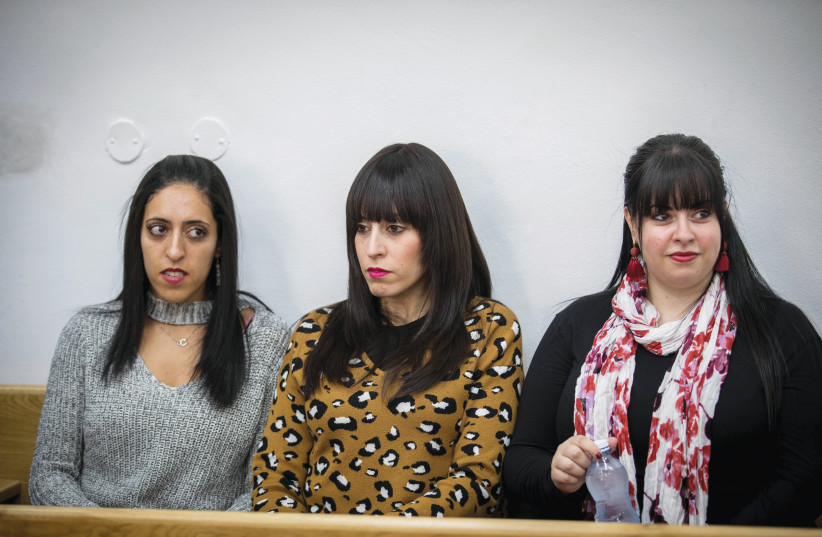Following the revelations of Chaim Walder’s sexual abuse, I decided to scan the Internet to see how the leading haredi rabbis were responding to Walder’s dramatic suicide and the allegations against him.
Would the rabbis turn their gaze inward and ask why sexual abuse occurs at such an alarming rate within their community (Walder, Malka Leifer, Yehuda Meshi Zahav, to name a few of the more public cases)?
Would they ask why Jerusalem’s Tahel Crisis Center receives approximately 500 calls per month from abuse victims within the Jerusalem haredi community?
Would they consult with mental health professionals such as myself and my colleagues who work within the religious community and have far too much experience treating sexual abuse victims?
(Most of the abuses cases are generally same-sex: Rabbis and older yeshiva students abusing younger yeshiva students, Leifer toward her female seminary students, and within families, both same-sex and opposite sex abuse occurs. Until recently, silence and obfuscation seemed to be the haredi response to abuse.)
Sadly, the answers to these questions are no, no and no.
Now, following the Walder crisis, the rabbis have chosen a new tactic, which I call “The Conspiracy of Deflection.” In the immediate aftermath of Walder’s suicide, the response was to impose an injunction against speaking “lashon hara” (slander) about Walder’s alleged abuse (Rabbi Gershon Edelstein, rosh yeshiva at Ponevezh Yeshiva in Bnei Brak) or to call accusations against Walder a secular conspiracy against the religious community (Rabbi Tzvi Tau, dean of Har Hamor Yeshiva, a religious-Zionist institution).

Very quickly, the haredi world realized that it was unwise to protect Walder. A grassroots movement within the haredi community, fueled by the Internet, was not buying the edict against speaking about Walder’s abuses. Chief Ashkenazi Rabbi David Lau received fierce criticism and calls for his resignation for paying a shiva call to the Walder home. At first, it seemed as if the rabbis were clueless about how the Walder crisis was playing in the haredi street. Haredi activists in Israel distributed around 320,000 flyers in protest of the leadership’s response to the sexual abuse accusations. The leaflets said “We all believe the victims.”
Chaim Walder was a haredi rock star, a feature in every ultra-Orthodox home, an individual who had enormous power and influence in shaping how parents raised their children. And that same haredi influencer turned out to be a polymorphic or crossover sexual offender, with victims in different categories, e.g., adult and child victims, male and female victims. He posed a huge problem for the haredi establishment, of which Walder was a central figure.
So, in response to the haredi street, the leading English-speaking haredi rabbis pivoted. Now, there was wall-to-wall acceptance of Rabbi Shmuel Eliyahu’s beit din (rabbinic court). Rabbi Edelstein’s injunction against speaking lashon hara against Walder was replaced with statements calling Walder, “a psychopath” (Rabbi Yitzchak Berkovits), “a rasha merusha” (terrible, evil man) (Rabbi Moshe Meiselman).
Both rabbis enjoined their listeners not to feel sympathy for this self-serving monster and told their followers to remove Walder’s books from their homes. For those of us in the mental health profession, who’ve been waiting for the rabbis to express zero tolerance for sexual abuse, this was a welcome change.
So, what happened next somewhat surprised me – I wish it hadn’t. Rabbi Meiselman, the rosh yeshiva of Toras Moshe in Jerusalem and a descendant of the Brisker dynasty, turned Chaim Walder into a non-haredi.
ACCORDING TO the rabbi, he was a well-known rasha years before the story broke and there were compelling rumors about him for more than 30 years. He quotes Rabbi Shmuel Auerbach, who called him a rasha and a sexual pervert. (Yes, that does raise questions as to why no one did anything about it. If so, then there needs to be an investigation into this egregious, rabbinical cover-up.)
But if that weren’t enough to banish him from the haredi world, Meiselman exiled him with these words: “He was a failed yeshiva student who served in the Israeli army.” And, he added, “Any serious ben Torah [moral individual] knew that Walder’s books were treyf [unfit to be read] and wouldn’t let them in his house.”
Yet, in his effort to banish Walder from the haredi world he conveniently overlooked the facts that “from 1990 to 2021, Walder was a regular columnist for the [haredi daily] Yated Ne’eman, writing about social issues. He also hosted a popular radio talk show. He headed the Center for the Child and Family, run by the Bnei Brak Municipality, and was an educational counselor working with haredi children who have suffered trauma and abuse. In 2003, he received the Magen LeYeled (Defender of the Child) award from the Israel National Council for the Children.” (From Wikipedia)

So, in an attempt to circle the wagons, the rabbis have established the following: 1. Chaim Walder was a rasha merusha; 2. We should feel no sympathy for him; 3. It is not lashon hara to speak about him; 4. He was not a bona fide haredi; and 5. He was a known abuser for years. (This one really has me troubled. I encourage readers to listen to Rabbi Meiselman’s YouTube talk about Walder where he cites multiple examples of how Walder was a known abuser.)
But here’s where the Conspiracy of Deflection begins: The rabbinical establishment has presented a solution to the problem of abuse:
Ban opposite gender therapy.
The problem with their solution is that it misses the point of sexual abuse. The rabbi’s inclusion of this injunction seems to imply that a monster like Walder wouldn’t have abused his victims if he had strictly adhered to the laws of yichud (seclusion with the opposite sex) and had been vigilant about not having private sessions with females.
The problem with this logic is the following:
1. He, like most of the abusers within both the National-Religious and haredi communities, have preyed on unsuspecting, same-sex minors, i.e., Malka Leifer, Moti Elon, Eliezer Berland, Yoel Malik, Zev Kaplovitch (former rosh yeshiva of Netiv Meir), to name a few. I have no doubt that the haredi establishment knows about multiple stories of abuse committed by rabbis and educators toward their students. Based on my personal experience, the most shocking cases of abuse within the religious world have been with male students.
2. Abuse of the magnitude that Walder allegedly committed has less to do with sexuality and far more to do with power and control. In our sexualized society, you don’t have to abuse helpless minors to satisfy sexual desires. What most sexual predators share are deep insecurities, an unconscious sense of powerlessness and a high probability of having been abused themselves. Their victims are always helpless, lacking agency and easily manipulated.
I ask the rabbis this: How does an injunction against a male/female counseling relationship relate to this tragic story regarding Walder? If anything, it steers the conversation in an unrelated direction while leaving the impression that abuse wouldn’t happen if we, professionals, were meticulous in following the guidelines of yichud.
3. The counseling relationship, like the relationship between a teacher and a student, has the potential for abuse. Any relationship that is, in part, predicated by an unequal distribution of power can lead to an abusive relationship whether it’s between a man and a woman, two men, two women, or an adult and a child.
I don’t know if Chazal predicted a world in which sexual perversion would be so ubiquitous and where the laws of yichud might be equally applicable to two men or two women or between an adult and a child. If so, how do we redefine the laws of yichud when the problem of abuse extends far beyond heterosexual and age parameters? *
(* In a 2008 article in the scholarly journal Criminal Justice and Behavior on sexual abuse among Catholic priests, I quote the following: “Findings reveal that the 3.7% [n =137] who had 10 or more victims accounted for a disproportionate 24.8% of the abuse. Priests with the most victims began perpetrating offenses at an earlier age and were more likely to have male victims than those who abused fewer victims.”)
4. If the rabbis were to canvass the leading mental health professionals, they would learn that there are many compelling reasons why a man might need to work with a woman and vice versa.
Two examples come to mind:
- A seven-year-old hassidic boy was raped by his uncle and would only agree to meet with a female therapist. The trauma was so profound that he was unable to remain in heder surrounded by male authority figures.
- A 21-year-old haredi woman was emotionally and physically abused as a child by her mother and had a deep fear of female authority figures. She would only work with a male therapist.
5. There is no question that mental health professionals must be exceedingly scrupulous in honoring the laws of yichud. It is imperative upon those of us in the profession who work with religious clients to consult with rabbinical authorities to create a safe environment that conforms to halachic norms while meeting the clinical needs of our clients.
Yes, there’s always a possibility that an unethical, heterosexual therapist will exploit that relationship for personal pleasure, but that risk exists in every helping relationship regardless of gender, as we sadly know.
To conclude I’d like to quote from the courageous remarks of Rabbi Yakov Horowitz of Monsey, New York, a haredi rosh yeshiva and founding dean of Yeshiva Darchei Noam, and a child safety advocate:
“Our community is not getting bad press because we have child molesters. Sadly, every society in the world has its share. We are getting slammed precisely because some folks seem to care more about our reputation and less about the safety of our children and the trauma of abuse survivors.
“Our public image will dramatically improve when we direct our focus inward; reporting abusers to the authorities, encouraging victims to come forward without fear of retribution, helping them get professional counseling, and making research-based, child safety training for children, parents and educators a top priority.”
The writer has been a psychologist since 1975 and a psychotherapist in private practice in Jerusalem since 1989. A published author and blogger writing on mental health issues, he can be contacted via his website: www.drmichaeltobin.com.
